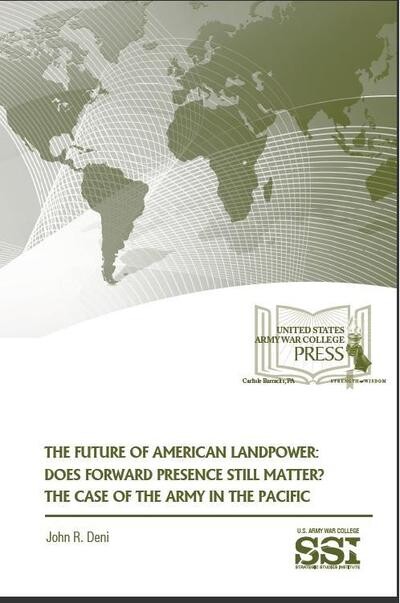hankyoreh
Links to other country sites 다른 나라 사이트 링크
Report calls on US military to shift resources away from Korea and Japan

By Jung E-gil, senior staff writer
Analysts in the US military are advising the government to scale back its presence in the Asia-Pacific region, including USFK.
A June report from the Strategic Studies Institute at the United States Army War College, titled “The Future of American Landpower: Does Forward Presence Still Matter? The Case of the Army in the Pacific,” (http://www.strategicstudiesinstitute.army.mil/pubs/display.cfm?pubID=1202) includes call for reductions and repositioning of troops in the region.
“The time has come for a reappraisal of the U.S. Army’s forward presence in East Asia, given the significantly changed strategic context and the extraordinarily high, recurring costs of deploying U.S. Army forces from the 50 states for increasingly important security cooperation activities across the Indo-Asia-Pacific theater,” researcher John Deni wrote in the report.
The monograph singled out the “dated basic paradigm” in the Indo-Asia-Pacific region.
“In many respects, the forward posture orientation of the Army today - on South Korea and, to a lesser degree, Japan - remains rooted in a rationale that has seen little wholesale re-assessment since the end of the Cold War,” Deni wrote.
Noting recent changes in the strategic environment in East Asia, Deni went on to observe, “[I]t is conceivable that the existing Army posture is not as effective or as efficient as it might be and is instead a victim of inertia.”
Deni also noted, “shifting U.S. Army resources from South Korea and Japan to elsewhere would likely increase their operational resilience by dispersing them around the Indo-Asia-Pacific theater.”
“[R]eduction in the Army presence in South Korea would have the added benefit of reducing administrative and logistical costs to the Army,” he added.
In terms of specific reductions to USFK’s scale, Deni wrote, “Arguably, that presence could be reduced to center on air and missile defense units and military intelligence, surveillance, and reconnaissance units - two functional areas that even the increasingly capable South Korean military would likely garner great value from continuing to host and interact with - while still providing South Korea with treaty-based assurance.”
The US Defense Department confirmed early this year that it had no plans to reduce its USFK presence. The latest calls drew notice as a sign that the US military is echoing calls from think tanks to scale back overseas landpower due to defense budget cuts and other factors.
Please direct questions or comments to [english@hani.co.kr]

Editorial・opinion
![[Column] Season 2 of special prosecutor probe may be coming to Korea soon [Column] Season 2 of special prosecutor probe may be coming to Korea soon](https://flexible.img.hani.co.kr/flexible/normal/500/300/imgdb/original/2024/0426/3317141030699447.jpg) [Column] Season 2 of special prosecutor probe may be coming to Korea soon
[Column] Season 2 of special prosecutor probe may be coming to Korea soon![[Column] Park Geun-hye déjà vu in Yoon Suk-yeol [Column] Park Geun-hye déjà vu in Yoon Suk-yeol](https://flexible.img.hani.co.kr/flexible/normal/500/300/imgdb/original/2024/0424/651713945113788.jpg) [Column] Park Geun-hye déjà vu in Yoon Suk-yeol
[Column] Park Geun-hye déjà vu in Yoon Suk-yeol- [Editorial] New weight of N. Korea’s nuclear threats makes dialogue all the more urgent
- [Guest essay] The real reason Korea’s new right wants to dub Rhee a founding father
- [Column] ‘Choson’: Is it time we start referring to N. Korea in its own terms?
- [Editorial] Japan’s rewriting of history with Korea has gone too far
- [Column] The president’s questionable capacity for dialogue
- [Column] Are chaebol firms just pizza pies for families to divvy up as they please?
- [Column] Has Korea, too, crossed the Rubicon on China?
- [Correspondent’s column] In Japan’s alliance with US, echoes of its past alliances with UK
Most viewed articles
- 1[Column] Season 2 of special prosecutor probe may be coming to Korea soon
- 2‘We must say no’: Seoul defense chief on Korean, USFK involvement in hypothetical Taiwan crisis
- 3Is N. Korea threatening to test nukes in response to possible new US-led sanctions body?
- 4Division commander ordered troops to enter raging flood waters before Marine died, survivor says
- 5Amnesty notes ‘erosion’ of freedom of expression in Korea in annual human rights report
- 6Is Japan about to snatch control of Line messenger from Korea’s Naver?
- 7No good, very bad game for Korea puts it out of Olympics for first time since 1988
- 8[Editorial] Korea’s surprise Q1 growth requires objective assessment, not blind fanfare
- 9N. Korean delegation’s trip to Iran shows how Pyongyang is leveraging ties with Moscow
- 10Korea’s 1.3% growth in Q1 signals ‘textbook’ return to growth, says government